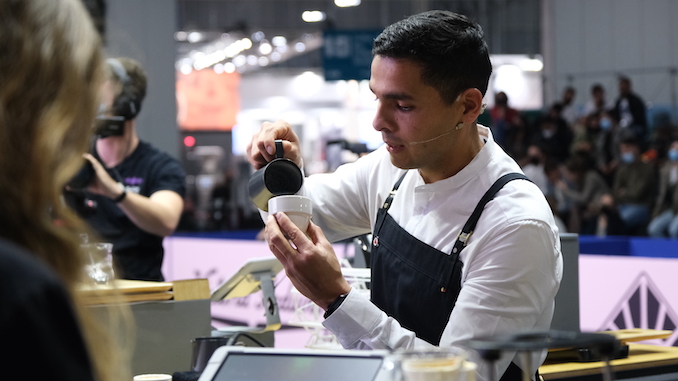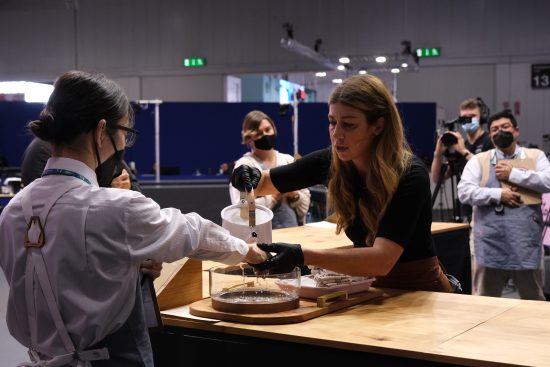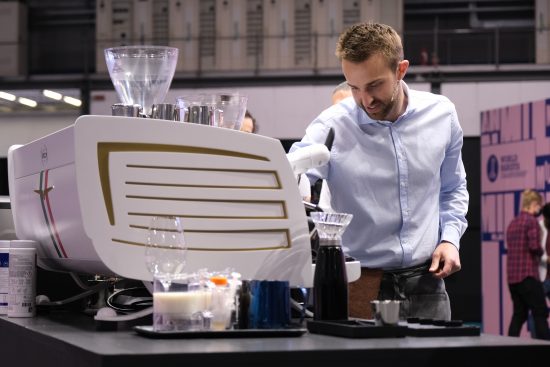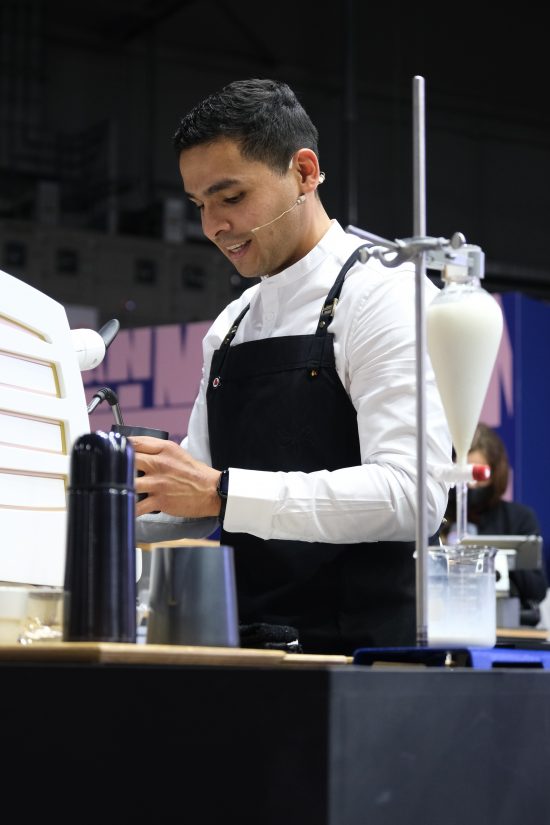
The forgotten coffee species has made its way onto the competition stage for its remarkable sweetness.
BY KATRINA YENTCH
BARISTA MAGAZINE ONLINE
Photos courtesy of the Specialty Coffee Association
When reigning World Coffee In Good Spirits champion Dan Fellows first took a sip of U.S. Barista Champ Andrea Allen’s competition espresso at this year’s World Barista Championship, an immediate grin broke out onto his face—one that looked impossible to hide. ”This just tastes like a cup of sunshine!” he exclaimed, describing the coffee choice: a delicate blend of a Cerro Azul Gesha and a resurrected species called Eugenioides.

What Is Eugenioides?
Eugenioides—try to say that three times in a row! This Greek mythology-sounding coffee species follows a trend that we have been witnessing in coffee growing over the past couple years. As climate change makes it more difficult to grow the Arabica species, we’ve noticed several other coffee species capture the interest of agronomists and coffee researchers. Some examples include Stenophylla and Excelsa, the latter of which is common to growing regions in Southeast Asia.
Although most of this research has not quite resulted in commercial production (yet), Eugenioides in particular has stolen the hearts of coffee competitors across the globe.
How Competitors Are Using It
Diego Campos battled his way to victory as the World Barista Champion, choosing to focus on the sensory experience with Finca Las Nubes’ expression of Eugenioides by pairing it alongside dry ice clouds and a large marble to emphasize the ”rounded body” of the coffee. Andrea Allen, who placed second at the WBC thanks to her efforts with the species, is one of several winning competitors who also utilized the inherent sweetness of the Eugenioides to create their own unique blends (blends being another growing trend for competition).
World Brewers Cup Champion Matt Winton also incorporated this coffee to level out the acidity of his blend with Catucai, as did Australian Barista Champ Hugh Kelly—who pulled the first 12 grams of his espressos over frozen rocks hovering above his espresso cups to maximize the initial flavor notes he experienced with the cooled coffee. After that first 12 grams, he pushed the rocks to the side for the remainder of the shots.

How Does Eugenioides Taste?
One thing all competitors have to say about Eugenioides? ”Unbelievably sweet.” As a re-emerging species, it has yet to achieve a consistently replicable taste for large markets, but its addictively sweet properties make it a coffee that competitors are captivated by, to say the least. Other tasting notes that competitors have attributed to it include candied and creamy strawberry, stevia sweetener, and guava. Given these notes—and the fact that competitors always love a good challenge—it makes sense that Eugenioides’ unlocked potential has made it a desirable coffee to introduce the judges to.
Where Does Eugenioides Come From?
Finca Inmaculada in Pichindé, Colombia, just outside of Cali, is the farm responsible for popularizing Eugenioides. The species itself, however, hails from the mountains of East Africa, including the areas of the Democratic Republic of Congo, Rwanda, Uganda, Kenya, and Western Tanzania.
Owned by the Holguin family, Finca Inmaculada’s specialty is growing rare coffee. According to Onyx Coffee Lab, their goal is to “produce the most extraordinary coffees possible, regardless of risk or costs.” As a result, many coffees that are grown at Finca Inmaculada are low-yielding and temperamental, but extremely rewarding in taste and cup quality. Other varieties that Finca Inmaculada grows include Gesha, Sudan Rumé, and Laurina.

Will Eugenioides Be the Next Gesha?
Upon personal speculation, the future of Eugenioides may follow a similar path as Gesha. A realization we’ve come to recognize, even during the pandemic, is that people are willing to pay more for the good sh**. Two offerings available to the consumer market presently are by Onyx Coffee Lab and Gardelli Coffee, both of which are beyond sold out. This is a good sign that there will certainly be a demand for these coffees at least during the holiday season, when people are more willing and ready to gift extraordinary coffees for their true coffee nerd friends.
As more farmers come to recognize the high value of this coffee, they will also likely be motivated to experiment with and grow this variety, and perhaps some will even make it to Cup of Excellence competitions in the near future.
Final Thoughts
One thing is for sure: Eugenioides has become a not-so-secret weapon for competitors, and we’re excited to eventually get a taste of this ”cup of sunshine” ourselves one day!

